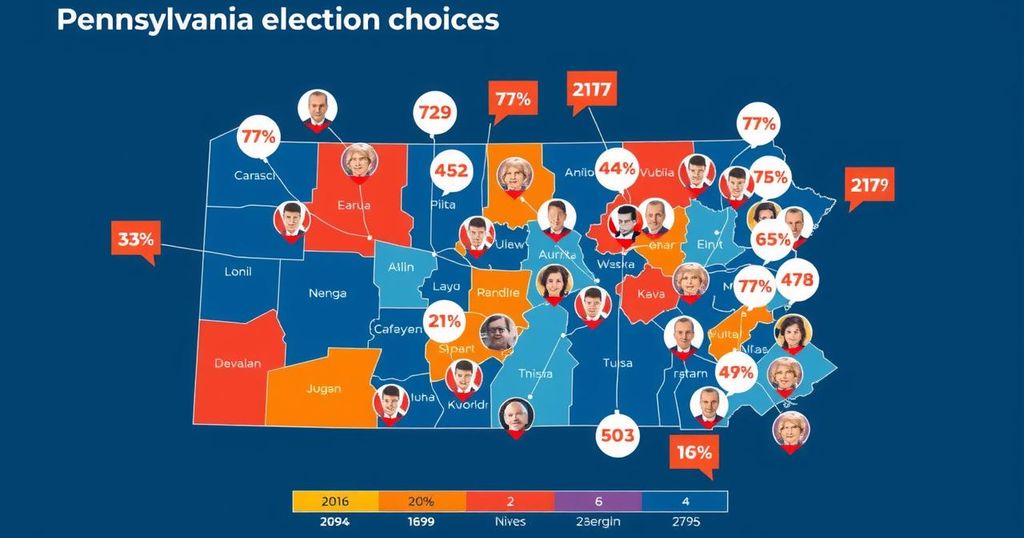Undecided Jewish Voters in Pennsylvania: A Pivotal Factor in the Upcoming Election

In Pennsylvania, undecided Jewish voters, disillusioned with the Democratic Party due to perceived neglect and rising antisemitism, represent a crucial demographic that could sway the upcoming election. The Republican Party is actively courting these voters by addressing their concerns related to Israel and antisemitism, while Democrats are mobilizing to reassure the community of their commitment to these issues. The political decisions made by these voters amid the current landscape could play a pivotal role in determining the election results.
In battleground Pennsylvania, the sentiment among undecided Jewish voters is tenuous, with many expressing disillusionment towards the Democratic Party this election season. A significant individual, Stephanie Spielman, articulated her distress as a lifelong Democrat who has opted to leave the party, citing their lack of serious engagement with the Jewish community amid rising antisemitism linked to the conflict in Gaza. This scene underscores a potential shift in the voting patterns of Jewish Americans, traditionally heard within the Democratic coalition, due to recent geopolitical events and domestic sentiments. The Republican Party, recognizing the vulnerability of Jewish voters in Pennsylvania, has intensified its outreach efforts, determined to garner support among this demographic by addressing concerns regarding antisemitism, Israel’s security, and economic stability. The Republican Jewish Coalition’s CEO, Matt Brooks, indicated a systematic approach in targeting Jewish voters, emphasizing issues traditionally significant to this community, including Israel, antisemitism, economics, and rising costs of living. Conversely, Democratic advocates, such as Amanda Berman, expressed alarm over the unprecedented number of undecided Jewish voters, arguing the need for clear communication about the Biden administration’s support for Israel and efforts to combat antisemitism. Organizations like the Jewish Democratic Council of America are mobilizing to present a counter-narrative, underscoring Vice President Kamala Harris’s commitment to both Israel and the Jewish community. As the election draws nearer, undecided Jewish voters find themselves at the center of political overtures. Their votes could prove critical in Pennsylvania where margins are slim, and dissatisfaction with both parties reveals profound uncertainties. In face of these tensions, Jewish voters are compelled to navigate a complex political landscape marked by rising antisemitism and their community’s historically strong affiliations and evolving concerns. The ultimate decision of these voters holds significant potential to sway the election results, highlighting the importance of addressing their unique challenges and perspectives strategically during this pivotal moment.
The article dives into the political dynamics surrounding Jewish voters in Pennsylvania amidst a heated election cycle. Traditionally aligned with the Democratic Party, these voters face unique challenges this year following Israel’s military actions and the resultant rise in antisemitic incidents. The implications of these developments have led to a fracturing of their historical voting patterns, creating opportunities for the Republican Party to appeal to this critical demographic. By investigating sentiments among undecided Jewish voters, the article highlights the potential impact of their decisions on the election outcome, particularly in light of narrowed margins in pivotal swing states like Pennsylvania.
In conclusion, undecided Jewish voters in Pennsylvania reside at the crossroads of an election shaped by rising antisemitism and complex international dynamics. Their historical loyalty to the Democratic Party is challenged by recent events and dissatisfaction with party leaders’ responses. This, coupled with intensified efforts by Republicans to attract these voters, encapsulates the shifting landscape of Jewish political affiliation. Ultimately, the votes cast by these individuals could be decisive in securing the state’s electoral votes, thereby significantly influencing the overall outcome of the presidential election.
Original Source: www.cnn.com







